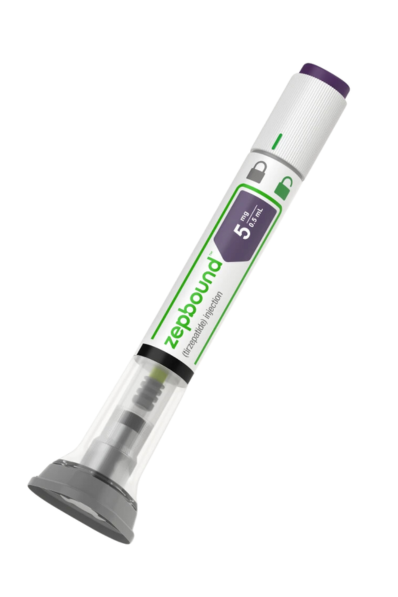Obstructive Sleep Apnea (OSA) is a prevalent condition affecting millions, often leading to serious health complications if untreated. The recent approval of Zepbound (tirzepatide) by the FDA as the first medication for OSA marks a significant advancement in treatment options. With Medicare Part D now covering Zepbound® for sleep apnea, patients have enhanced access to this innovative therapy.
Last Updated on January 10, 2025 by justin@lifeivtherapy.com
Understanding Obstructive Sleep Apnea (OSA)
Obstructive Sleep Apnea is a sleep disorder characterized by repeated interruptions in breathing during sleep due to the relaxation of throat muscles, leading to airway blockage. This condition results in fragmented sleep and can cause daytime fatigue, cardiovascular problems, and other health issues. OSA is more prevalent among individuals with obesity, as excess weight contributes to airway obstruction.
Introduction to Zepbound (Tirzepatide)
Zepbound, known generically as tirzepatide, is a medication initially developed for weight management in adults with obesity. It functions by mimicking hormones that regulate appetite and food intake, promoting weight loss. Recent studies have demonstrated its efficacy in reducing the severity of OSA symptoms, leading to its FDA approval for this specific use.
FDA Approval of Zepbound for Sleep Apnea
On December 20, 2024, the FDA approved Zepbound as the first medication for treating moderate to severe obstructive sleep apnea in adults with obesity. Clinical trials indicated that patients treated with Zepbound experienced significant reductions in apnea events and substantial weight loss over a 52-week period. This approval offers a pharmacological alternative for patients who struggle with traditional treatments like continuous positive airway pressure (CPAP) devices.
Medicare Part D Coverage for Zepbound
Following the FDA approval, the Centers for Medicare & Medicaid Services (CMS) confirmed that Zepbound could be covered under Medicare Part D plans for the treatment of sleep apnea. This development enhances access to the medication for eligible beneficiaries, potentially improving health outcomes for those with OSA.
Eligibility Criteria for Coverage
To qualify for Medicare Part D coverage of Zepbound, patients must meet specific criteria:
- Diagnosis of moderate to severe obstructive sleep apnea.
- Body Mass Index (BMI) indicating obesity.
- Prescription from a healthcare provider for Zepbound as part of a comprehensive treatment plan.
Cost Considerations
While Medicare Part D covers a portion of the medication cost, patients may still be responsible for premiums, deductibles, and copayments. The out-of-pocket expenses can vary based on the specific Part D plan. Patients are advised to review their plan details and consult with their healthcare provider to understand the financial implications.
Accessing Zepbound Through Medicare Part D
Patients interested in Zepbound should take the following steps:
- Consult with a healthcare provider to determine if Zepbound is appropriate for their condition.
- Ensure enrollment in a Medicare Part D plan that includes Zepbound in its formulary.
- Obtain the necessary prescription and any required prior authorizations.
- Work with the pharmacy and insurance provider to manage coverage and copayment processes.
Impact on Patients with Obstructive Sleep Apnea
The availability of Zepbound offers several potential benefits for patients:
- Improved access to a novel treatment option.
- Potential for significant weight loss, which can alleviate OSA symptoms.
- Enhanced quality of life due to better sleep patterns and reduced health risks associated with untreated OSA.
Broader Implications for Healthcare
The inclusion of Zepbound in Medicare Part D coverage reflects a growing recognition of the interconnectedness of obesity and sleep disorders. This development may encourage further research and investment in pharmacological treatments for conditions traditionally managed through lifestyle changes or mechanical devices.
Frequently Asked Questions (FAQs)
Is Zepbound covered by all Medicare Part D plans?
Coverage may vary between plans. Patients should verify with their specific Part D provider to confirm if Zepbound is included in the formulary.
What are the common side effects of Zepbound?
Reported side effects include nausea, diarrhea, vomiting, constipation, and stomach discomfort. Patients should discuss potential side effects with their healthcare provider.
Can Zepbound be used in conjunction with CPAP therapy?
Studies have shown that Zepbound can be effective both as a standalone treatment and in combination with CPAP therapy. The appropriate treatment plan should be determined in consultation with a healthcare provider.
How does Zepbound compare to other weight-loss medications?
Zepbound is unique in its dual action on GLP-1 and GIP receptors, which may contribute to its efficacy in weight loss and OSA symptom reduction. Patients should discuss with their healthcare provider how it compares to other medications based on their individual health profile.
Are there any contraindications for using Zepbound?
Zepbound is not recommended for patients with a personal or family history of medullary thyroid carcinoma or multiple endocrine neoplasia syndrome type 2. A thorough medical evaluation is necessary to determine suitability.
Conclusion
The FDA approval and subsequent Medicare Part D coverage of Zepbound for obstructive sleep apnea represent a significant advancement in the treatment landscape for this condition. Patients now have access to a pharmacological option that addresses both weight management and sleep apnea symptoms, potentially improving health outcomes and quality of life.
Disclaimer
All trademarks mentioned in this article, including “Zepbound,” “Tirzepatide,” and “Medicare Part D,” are the property of their respective owners. Life IV Weight Loss does not claim any affiliation or endorsement by these trademark holders. This content is for informational purposes only and should not be considered medical or legal advice. Always consult with a qualified healthcare provider or legal professional for personalized guidance.

